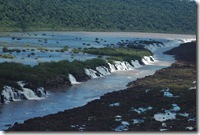 OUP USA has announced a new text by Prof Kenneth J. Vandevelde at the Thomas Jefferson Law School.
OUP USA has announced a new text by Prof Kenneth J. Vandevelde at the Thomas Jefferson Law School.
It’s vital statistics are:
518 pages |Hardback | £110.00 |
An abstract from OUP is below the jump and more details are on their website.
 OUP USA has announced a new text by Prof Kenneth J. Vandevelde at the Thomas Jefferson Law School.
OUP USA has announced a new text by Prof Kenneth J. Vandevelde at the Thomas Jefferson Law School.
It’s vital statistics are:
518 pages |Hardback | £110.00 |
An abstract from OUP is below the jump and more details are on their website.
 As mentioned previously, the ICJ has delivered its decision in the Pulp Mills on the River Uruguay Case (Argentina v Uruguay) resulting in a resounding victory for Argentina. The court held that there had been a technical breach of the duty to consult Argentina under the Statute of the River Uruguay.
As mentioned previously, the ICJ has delivered its decision in the Pulp Mills on the River Uruguay Case (Argentina v Uruguay) resulting in a resounding victory for Argentina. The court held that there had been a technical breach of the duty to consult Argentina under the Statute of the River Uruguay.
A round up of the latest decisions made public in the last seven days.
Alpha Projektholding GmbH v. Ukraine, ICSID Case No. ARB/07/16 (Austria/Ukraine).
–Decision on Respondent’s Proposal to Disqualify Arbitrator,
19 March 2010.
Bureau Veritas, Inspection, Valuation, Assessment and Control, BIVAC B.V. v. Republic of Paraguay, ICSID Case No. ARB/07/9 (Netherlands/Paraguay BIT).
–Decision of the Tribunal on Objections to Jurisdiction, 29 May 2009.
Joseph Charles Lemire v. Ukraine, ICSID Case No. ARB/06/18 (US/Ukraine BIT).
Merrill & Ring Forestry L.P. v. Canada, UNCITRAL, ICSID Administered Case (NAFTA).
The two decisions of note are Merril & Ring Forestry v Canada which continues the discussion of discrimination in cases such as Pope & Talbot and S. D. Myers, and Lemaire v Ukraine which jurisdictional objections for an investment that concerns radio licences in the Ukraine. This is one of the first cases I know of concerning the outcome of a tender procedure, and it will be interesting to see what the decision is at the merit stage.
 The British Institute of International and Comparative Law has announced their next investment treaty forum for 07 May 2010 focused on jurisdictional objections available to respondent states. Issues that will be considered include:
The British Institute of International and Comparative Law has announced their next investment treaty forum for 07 May 2010 focused on jurisdictional objections available to respondent states. Issues that will be considered include:
…important developments in recent cases on jurisdiction by investment treaty tribunals. These developments include illegality (Fraport), fraud (El Salvador) and other instances of an investor’s misconduct. Other topics for consideration will also include piercing the corporate veil (TSA Spectrum), unmeritorious and abusive claims (Phoenix), restrictive dispute resolution provisions (old China and Soviet BITs e.g. Tza Yap Shum and Renta 4) and the ongoing debate about what type of investments should not benefit from treaty protection. The speakers will discuss how and why these restrictions have affected the jurisdiction of tribunals.
Everything you want to know about the event can be found here. Find even more about the BIICL here. They also publish the ICLQ. I’m not sure what further social validation you need.
 The International Court of Justice (ICJ) will deliver its Judgment in the case concerning Pulp Mills on the River Uruguay (Argentina v. Uruguay) on 20 April 2010. The Vice-President of the Court, acting as President in the case, Judge Peter Tomka, will read the Court’s Judgment.
The International Court of Justice (ICJ) will deliver its Judgment in the case concerning Pulp Mills on the River Uruguay (Argentina v. Uruguay) on 20 April 2010. The Vice-President of the Court, acting as President in the case, Judge Peter Tomka, will read the Court’s Judgment.
The case is of interest for how it will treat the attribution of acts to the two states (there are a variety of private parties involved) and the calculation of damages and compensation for something as ethereal as diminished water quality and non-consultation.
The dispute arises out of the Uruguay River is shared by the two countries and is protected by a treaty, the 1975 Statute of the River Uruguay, which requires both parties to inform the other of any project that might affect the river.
Argentina claimed that the Uruguayan government had not asked for permission to build various paper mills along the river for a private operator and that water pollution was crossing state boundaries. Uruguayan authorities countered that the Treaty does not require that permission be obtained, but merely that the other party be appropriately informed, and that conversations had indeed been held and filed, without objections on the Argentinean part.
Further details on the ICJ case can be found on the ICJ’s website as can the judgement once it is delivered. A more extensive background of the dispute can be found on Wikipedia
OUP has released a new text by Professor Peter Cameron at the University of Dundee (UK).
It’s vital statistics are:
560 pages | 246x171mm|
| Hardback | £145.00 |
An abstract from OUP is below the jump and more details are on their website. I don’t know of any reviews of it out yet.
Kazakhstan applied to annul the award given by the ICSID tribunal in this case under Article 52 of the ICSID Convention. Ultimately the Annulment Committee decided that the award should stand.
On the way the Annulment Committee elaborated how any Annulment Committee should assess the quantum of damages that are awarded by the tribunal, holding that regard could be had to the entire record before the tribunal when the reasons on the face of the award might be insufficient and giving a wide deference to the tribunal due to the complications inherent in assessing future loss.
The Associated Press is reporting that Ecuador has unsurprisingly taken the position that they will not accept the partial award on the merits made earlier this week.
Understandably so, given that the award implies that the judicial system in Ecuador is ineffective at best and jaundiced against (at least some) foreign claimants at worst.
QUITO, Ecuador — Ecuadorean officials are rejecting an international arbitration tribunal’s ruling that it violated international law and must pay $700 million to the Chevron Corp.
President Rafael Correa’s administration is analyzing options for appeal under national and international law, Attorney General Diego Garcia said in a statement Wednesday.
“This new effort to compromise the Ecuadorean state in its firm commitment to respect the independence of its judicial system … will not succeed,” Garcia said.
Read the full article here
Two major avenues that immediately suggest themselves for Ecuador. The first is that Ecuador can appeal the award to a competent court. The second is to resist enforcement under the New York Convention and on the grounds of sovereign immunity. Both look like viable options.
The UNCITRAL tribunal in Chevron v Ecuador has released its first partial award on the merits, holding in favour of the oil company. This is the first part of a multi-stage arbitration that disposes of claims for US$ 700 million, with claims in total amounting to US$ 27 billion to be eventually decided by the tribunal.
Chevron claimed that they had been manifestly denied justice by the Ecuadorian courts, in violation of the ‘access to justice’ provision of Art II(7) of the USA – Ecuador BIT.
ILSA has announced that the 2011 Jessup Compromis will address the legality of the use of unmanned drones and international anti-corruption law.
First things first – I think there has to be a special prize to one fellow judge who remarked that after a year of peaceful coexistence, Jessup would return to its root in war and chaos. I think unmanned drones and bribery fit right into that.